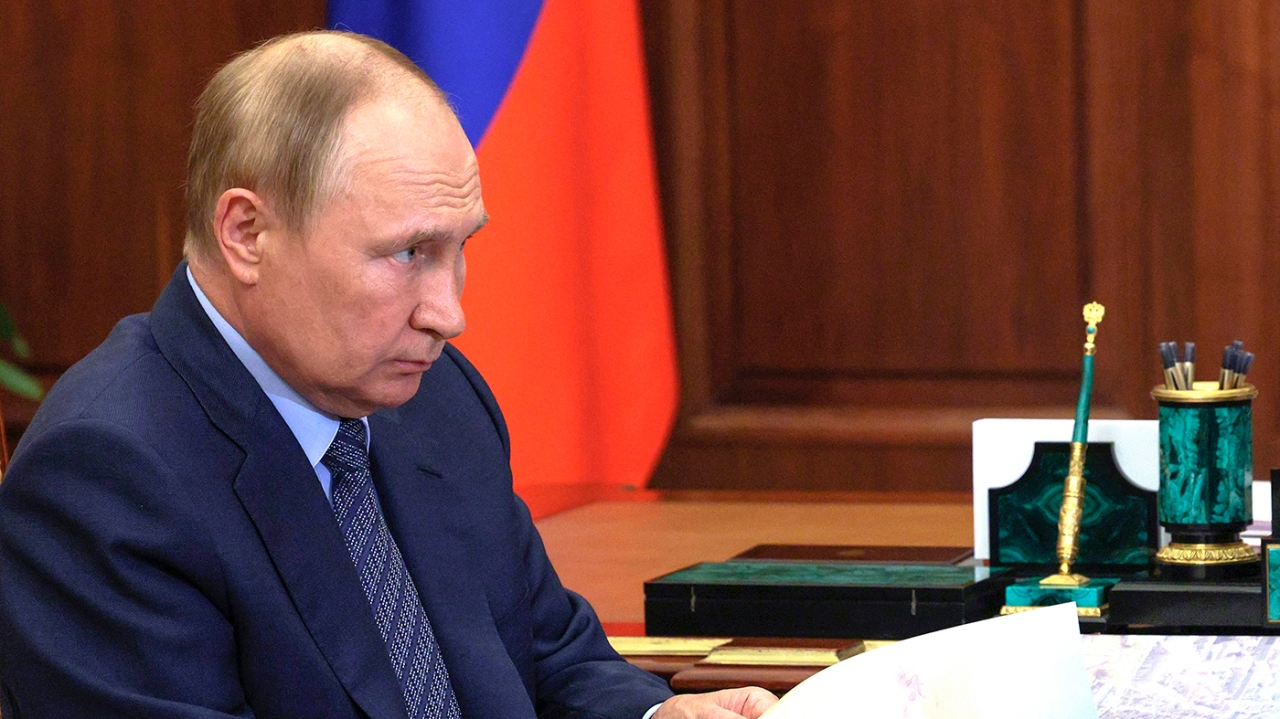
Russian President Vladimir Putin is becoming more dangerous and desperate as he faces growing pressure at home over the flailing war effort in Ukraine, observers of the conflict and Moscow say.
Putin in the last week has renewed his threats of using nuclear weapons in Ukraine and moved to annex territories from Ukraine, while arguing attacks on that territory would amount to an attack on Russia.
His government is also suspected in leaks to a pipeline under the Baltic Sea that carries fuel to Europe, although the gas flow was earlier suspended.
The new threats come after a mobilization effort of 300,000 reservists in Russia, announced in response to criticism of Putin’s war effort, received blowback across the country. Images of lines of cars seeking to get across the border into neighboring states have circulated, underscoring internal tensions over the war.
The Biden administration and U.S. allies have reacted forcefully, warning that the use of nuclear weapons would lead to serious consequences.
Outside experts describe a tinderbox of sort.
“He is dangerous, he is desperate,” said Daniel Fried, distinguished fellow at the Atlantic Council and a former U.S. ambassador to Poland.
“Because he’s in a weak position he’s doubling down on what he may consider to be his strongest remaining assets: nuclear threat and ability to use violence to achieve his aims, such as blowing up the Nordstream pipelines, if in fact Russia is responsible, which it appears they may be. He’s hoping to use unpredictability as a tactical weapon to intimidate the West.”
Putin has warned that threats to use nuclear warheads are not a bluff, and the White House on Wednesday took notice.
“We take Russia’s threat to use nuclear weapons seriously,” White House press secretary Karine Jean-Pierre said Wednesday. “But we have not seen any reason to adjust our own nuclear posture and we will not be deterred from supporting Ukraine.”
At the Pentagon, a senior defense official reiterated that the U.S. had given a warning to Moscow.
“We have clearly warned Moscow that any use of nuclear weapons would result in serious consequences. We’re not going to get into the specifics of what those specific responses would be,” the official said.
“In terms of allies, we are very much in close consultation with our allies on all matters related to Ukraine, but also certainly on all aspects of the Russian threat,” the official added. “But of course, the United States also has its own prerogative to employ a U.S. option.”
More than 100,000 Russian men are reportedly fleeing the country, while protests are taking place at dozens of locations in response to the mobilization effort. There have been instances of violent retaliation against military recruiters.
The U.S. Embassy in Moscow has warned Americans to immediately leave the country and that dual citizens may be conscripted to fight.
The annexation of at least four territories in Ukraine — a process initiated through contests the U.S., allies and the United Nations have rejected as “sham referenda” with staged results — is raising the threat of a greater global confrontation.
Jean-Pierre on Wednesday condemned the votes as “pre-staged and orchestrated by the Kremlin,” pointing to armed guards who hovered near voting locations as attempts to intimidate and influence voters.
The Biden administration, in its delivery of heavy artillery to Ukraine, has requested and received assurances from the Ukrainians that they would not strike within Russian territory out of a fear that such an action would escalate a bigger reaction from Russia.
But that limit is not expected to apply to Ukrainian territory forcibly occupied by Russia.
“Ukraine has the absolute right to defend itself throughout its territory, including to take back the territory that has been illegally seized one way or another by Russia,” Secretary of State Antony Blinken told reporters on Tuesday. “The weapons that we and many other countries are providing them have been used very effectively to do just that.”
The U.S. has not adjusted its nuclear posture in response to Putin’s latest comments, a sign both that it does not see an imminent threat and that it does not want to escalate the conflict.
Still, lawmakers like Sen. Chris Coons (D-Del.), a close Biden ally, are raising alarm.
“I am concerned that Vladimir Putin is increasingly desperate,” Coons said in an interview with MSNBC. “We should always take seriously his threats to use nuclear weapons. But frankly we need to push back, as President Biden has, and make clear that for him to do that would bring a swift and decisive response by NATO.”
Some analysts say that Putin is unlikely to use nuclear weapons given the near unanimous blowback he would likely receive.
“Anyone who understands the dynamics of the international community knows there’s no way that the international community can stand by, the day after, any government uses a nuclear weapon for the first time since World War II, everything would change,” said Evelyn Farkas, executive director of the McCain Institute at Arizona State University.
“Vladimir Putin has to know that. He has to know that he would face conventional attacks and that he would face an attempt to maneuver him out of the Kremlin, out of office, by the international community.”
Still, experts believe Putin’s latest moves — mobilizing troops, mentioning the threat of a nuclear response and annexing territory through manipulated votes — are signs of an increasingly desperate leader who is faced with the tide of the war in Ukraine turning against him.
Mark Cancian, a senior adviser at the international security program at the Center for Strategic and International Studies, said he believes Putin’s strategy at this point may be to lengthen the war into the winter, when energy costs in Europe will rise, the fighting will grow more difficult and cracks may begin to form across the continent.
Farkas echoed that Putin has long employed actions as a strategy to buy time.
“Most of his political experience ruling Russia and waging war has taught him, that if he buys a little time, he may be able to pull a rabbit out of a hat, he might get a stroke of luck or something else might happen. So he has benefited from this ability to buy time until something else happens, or he can cause something else to happen, or he can wait out his opponents, or who knows what,” she said.
Ellen Mitchell contributed to this story.




